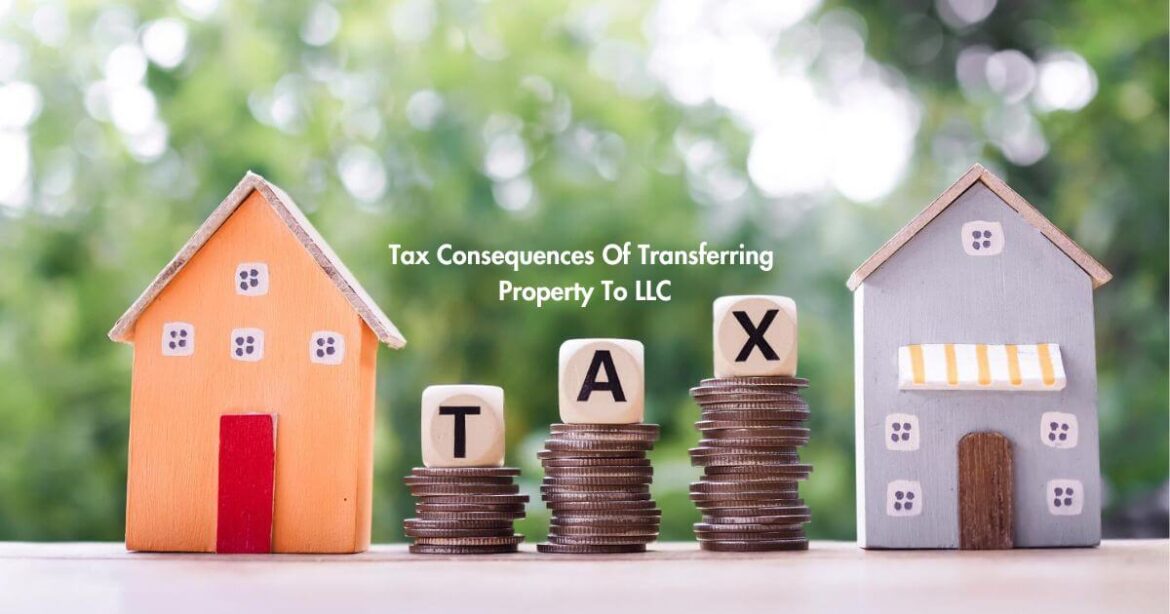Last Updated on March 15, 2025 by Amrita Das
As a real estate investor, there may come a time when you may consider transferring your rental property to a limited liability company (LLC). This decision is often driven by the desire to protect personal assets and reduce liability risk. However, before taking this step, it is important to understand the potential tax consequences.
In this article, we will discuss the potential tax consequences of transferring a rental property to an LLC and explore why many real estate investors choose to use this method. Ultimately, you’ll have a better understanding of how LLCs can affect your taxes and whether they’re the right choice for your real estate investment.

Read Also: How To Pay No Taxes On Rental Income: A Detailed Guide
What Is An LLC? Tax Consequences Of Transferring Property To LLC
An LLC is a popular choice for small businesses and real estate ventures due to its flexible structure. It allows owners to combine the benefits of a corporation, partnership, and sole proprietorship in one entity. This provides them with more control over their business operations and financial decisions.
One of the key advantages of an LLC is its limited liability protection for its members. This means that the personal assets of owners are shielded from any business debts or legal obligations. This is especially beneficial in the case of rental properties, where it is common for lawsuits and accidents to occur.
In addition to personal asset protection, an LLC also offers tax advantages for its members. It provides flexibility in terms of how profits and losses are allocated among owners, allowing them to save on taxes.
Another important aspect of an LLC is its ability to keep rental property assets legally separated. By using multiple LLCs for different properties, investors can protect each individual asset from being affected by issues related to the other properties. This adds another layer of protection and minimizes potential risks for owners.
What Are The Tax Consequences Of Transferring Property To LLC?
Assessing the tax consequences when shifting a rental asset to an LLC: Though shifting your rental property into a limited liability company (LLC) might not directly incur taxes, this maneuver can still have implications on your future tax situation.
Here are several key tax repercussions that should be on your list:
Anticipating Future Tax Liabilities from Appreciation
There’s a potential for tax liability on any profits if your rental has increased in value and you’re transferring it into the LLC at a value that exceeds the cost basis initially established for tax purposes. This is especially pertinent if you have claimed depreciation deductions over the years, which have reduced the property’s cost basis.
To forecast and mitigate any consequences from taxable appreciation, you would benefit from consulting with a certified public accountant. Techniques such as carrying out a 1031 exchange might be effective in postponing federal taxes on income.
Consequences For Properties With Increased Basis
Properties acquired through inheritance or as gifts usually have their tax basis adjusted to their market value at the time of acquisition, allowing you a greater basis for depreciating the asset and diminishing tax liabilities.
Nevertheless, this upper hand can be forfeited once the real estate is put into the LLC, as the tax basis reverts to what the original buyer forked out for it, potentially heightening your tax burden.
Alterations To Property Tax Responsibilities
Altering the deed ownership by transferring your rental property into an LLC influences your property taxes. To begin with, any change in ownership could prompt a reassessment by the county of the property’s market value for taxation—potentially increasing its tax-assessed value and, therefore, your tax bill.
Beyond this, some localities might enforce an assignment tax connected to the mortgage when a rental property changes hands. This fee is typically quantified between 1% and 2% of the mortgage’s total value. You would need to settle this cost upon the title’s modification.
Additionally, be mindful of state-specific regulations regarding the transfer of property between entities, as this could also result in additional taxes or expenses.
Effects On Personal Income Taxes
Another consideration to bear in mind when moving your rental property into an LLC is the potential impact on your income taxes. Depending on how the LLC is structured, any profit or loss generated by the rental may be passed through to you as the owner and included in your tax return.
This could result in a higher taxable income if the rental is generating a profit, or potentially offset other income if the property is operating at a loss. Additionally, any distributions made to LLC members may also be subject to personal income taxes.
Read More: Tax Consequences Of Adding Name To Deed: What You Need To Know
Why Transferring Rental Real Estate Assets Into A LLC Is Beneficial?
Transferring rental real estate assets into a limited liability company (LLC) can be a savvy move for property investors seeking both financial advantages and personal asset protection. Here’s a deep dive into the specific benefits and the tax implications of such a strategic decision:
Enhanced Personal Liability Safeguards
One of the most compelling reasons for moving your rental portfolio into an LLC is the substantial layer of liability protection afforded. This structure effectively separates your holdings from your business assets, thus insulating you in several scenarios:
- Legal Actions: If a tenant or contractor brings forth a lawsuit alleging injury or discriminatory practices, an LLC restricts any judgments to its business assets, sparing your personal wealth.
- Foreclosure Situations: Should an LLC-owned property go into foreclosure, the loss is contained within the business—your personal assets remain untouched by creditors.
- Contractor and Individual Claims: Any claims specific to the property or related accidents are confined to the LLC, safeguarding other investments.
Importantly, creating individual LLCs for each property fortifies your investment strategy – issues with one asset don’t jeopardize the others.
Tax Efficiency And Flexibility
LLCs offer distinct tax benefits that can significantly impact your financial outcomes:
- Pass-through Taxation: LLCs enjoy a single taxation point, unlike corporations. Earnings and losses flow directly to your individual tax return, bypassing the corporate tax rate and reducing your tax burden.
- Tax Filing Options: With flexibility in filing as a single or multi-member LLC, you can tailor your approach. A single-member LLC mimics a sole proprietorship, while a multi-member one parallels a partnership—both simplifying tax paperwork.
- Essential Loss Deductions: Real estate losses from LLC-owned rental properties can be deducted against active income, contingent on passive activity guidelines. These can offset your income tax, but always consult with a tax professional for specifics concerning your situation.
An LLC formation is especially potent for protecting assets from personal tax debts. Should the IRS target you individually, assets within your LLC are generally out of reach from personal tax liens.
Strong Creditor Deterrents
Beyond lawsuits, an LLC shields your investment properties from other personal financial entanglements. Defaulting on one loan won’t endanger assets in separate LLCs. Hence, each LLC operates as a standalone entity, immune to cross-creditor claims.
Privacy Advantages
Enveloping your assets within an LLC can also cloak your investment footprint. Public registries reveal only the LLC’s details, not your private information. This separation ensures anonymity, keeping your full property portfolio discreet.
You elevate this anonymity further by strategically titling each property to an individually named LLC. Contractors, tenants, and financial institutions remain uninformed about the breadth of your investments. The result? Enhanced privacy and an additional protective barrier.
Step-By-Step Guide To Transferring Your Rental Property To An LLC
Looking to secure your rental property under the shield of a limited liability company (LLC)? Follow this streamlined procedure to seamlessly switch ownership and enhance your asset’s protection.
Establishing Your LLC
Begin by selecting a name for your LLC that embodies simplicity and professionalism. Verify its availability via your Secretary of State’s office. Once you have a name, formalize your LLC by submitting the Articles of Organization and settling any state-mandated fees.
Ensure you’re listed as the registered agent and manager, and allocate membership shares accordingly if you’re not the sole member.
Securing An Employer Identification Number (EIN)
An EIN is a must-have for your LLC, functioning as its tax identification number. It’s crucial for tax filings, payroll, and setting up your LLC’s bank account. Apply for your EIN with ease on the IRS website at no charge.
Opening An LLC Bank Account
With your EIN in hand, proceed to open a distinct bank account for your LLC. This bank account should solely handle income and expenses related to your rental property, maintaining a clear separation from personal finances for liability protection.
Transferring The Property Title
Transfer the ownership of your rental property to your LLC via the county recorder’s office. Choose between:
- Quitclaim Deed: Ideal for non-sale transfers, this deed shifts your interest in the property to the LLC with no title guarantees.
- Warranty Deed: Offering the LLC more security, this deed confirms that you possess an unencumbered title to the property.
Consulting With Your Mortgage Lender
If your property is mortgaged, inform your lender about the change and execute the formal procedures including signing new documents. An assumption fee may be applied.
Updating Involved Parties
Communicate the change in property ownership to:
- Tenants: Notify tenants of the new ownership details for rent payments and keep a record of this correspondence.
- Insurance Providers: Shift policies to the LLC to cover liability, property damage, and potential loss of rental income.
- Utility Services: Ensure that utilities are billed to the LLC for ongoing property-related expenses.
- Additional Parties: Update property management firms, homeowners’ associations, and any other entities involved with managing your property.
Adjusting Official Documents
Should you hold permits or licenses for your rental property, revise them to reflect your LLC’s proprietorship.
Tax Preparation with an Accountant
Address the financial implications of transferring your rental property to an LLC with a tax expert. Explore how it may influence capital gains taxes, property value for taxation, and depreciation schedules.
Adhering To LLC Regulations
Finally, maintain diligent adherence to LLC financial management and record-keeping mandates, and comply with any annual reporting stipulations for the successful administration of your LLC.
Additional Factors To Consider
In addition to the steps outlined above, there are a few other factors to keep in mind when transferring your rental property to an LLC:
- Consult with an attorney to ensure that the transfer is done correctly and in compliance with state laws.
- Consider obtaining liability insurance for additional protection, as operating under an LLC does not provide complete immunity from lawsuits.
- Keep thorough records of all transactions and finances related to your LLC, as this can help protect you in case of any legal issues.
- Keep yourself informed on any changes in state regulations or tax laws that may affect your LLC and its operations.
- Consider the long-term goals for your LLC and how it fits into your overall investment strategy.
By considering these additional factors and staying proactive in managing your LLC, you can confidently transfer your rental property to an LLC and enjoy the benefits of increased protection and organization.
Considerations For Choosing The Right Deed
When deciding which type of deed to use for transferring real estate to an LLC, it is important to consider the level of protection and guarantees you want as a buyer. A warranty deed provides more security and assurance that the property’s title is clear, making it a preferred choice for most buyers.
However, a quitclaim deed can be a suitable option if there are known issues with the property’s title or if the buyer is comfortable taking on any potential risks. It is also essential to check your local laws and regulations to determine which type of deed is commonly used in your area.
The Importance Of Properly Executing The Deed
No matter which type of deed you choose, it is crucial to properly execute and record the deed with the county recorder’s office. This guaranty that the transfer is valid with legally unbreakable. Failing to follow the proper procedures can result in complications or even legal disputes in the future.
It is recommended to consult with a real estate attorney or a licensed agent familiar with local laws to ensure a smooth and valid transfer of property ownership.
Consider Seeking Professional Guidance
Transferring real estate from an individual owner to an LLC involves complex legal processes, which may vary depending on your jurisdiction. Hence, it is advisable to seek professional guidance while making such important financial transactions.
A lawyer or experienced real estate agent can help review all necessary documents and guide you through the process, ensuring that everything is done correctly and in compliance with local laws.
This can provide peace of mind and minimize any potential risks or complications in the future. Overall, choosing the right deed and properly executing it is crucial for a successful transfer of real estate ownership to an LLC.
Read More: Tax Implications Of Selling A House Below Market Value
Can I Transfer My Mortgage To An LLC?
The short answer is yes, you can transfer your mortgage from an individual to an LLC. However, this process may involve various considerations and potential challenges that must be carefully evaluated before making a decision.
In this section, we will discuss some key factors to keep in mind when considering transferring your mortgage to an LLC.
Due-On-Sale Clause
One of the most important things to consider is the presence of a due-on-sale clause in your mortgage agreement. This clause stipulates that if there is any change in ownership or title of the property, the full outstanding balance of the mortgage becomes immediately due and payable.
Therefore, transferring your mortgage to an LLC may trigger this clause and could result in the lender demanding immediate repayment.
Property With A Mortgage
In a mortgage agreement, the buyer is the legal owner of the property and is responsible for fulfilling all terms and conditions, including making regular payments. If you transfer your mortgage to an LLC, the LLC will need to qualify as a borrower in order for the lender to approve the transfer.
This may involve providing financial documentation and demonstrating the LLC’s creditworthiness and ability to repay the loan.
Transfer Tax Implications
The transfer of a mortgage from an individual to an LLC does not usually have any direct impact on property taxes. The responsibility for paying property taxes generally remains with the property owner, regardless of whether it is an individual or an LLC.
However, once ownership is transferred to the LLC, they will be responsible for paying property taxes on the property.
Transfer Property Title
In order to transfer ownership from an individual to an LLC, a new deed must be prepared. This process involves the current owner executing a new deed that transfers ownership to the LLC.
The type of deed used may vary depending on local laws and practices, but it is important to ensure that all necessary steps are taken in order for the transfer to be legally recognized. It is recommended to seek legal advice during this process.
Can I Claim A Tax Deduction For Losses When Transferring Property To An LLC?

No, unfortunately, you cannot claim any tax deductions for losses incurred when transferring property to your Limited Liability Company (LLC). The Internal Revenue Service (IRS) does not allow such deductions for individuals or businesses.
However, this does not mean that there are no potential tax benefits to transferring property to an LLC. Depending on your specific situation, there may be ways to minimize taxes or maximize deductions for your LLC.
It is always best to consult a tax professional or attorney before making any decisions regarding property transfers and potential tax implications.
In addition, different states have varying laws and regulations when it comes to LLCs and taxation, so it is important to research and understand the specific rules in your state before proceeding with any property transfers.
How Can I Reduce My Tax Liability When Transferring Assets To An LLC?
Maximizing Tax Deductions
One way to minimize tax consequences when transferring property to an LLC is by maximizing tax deductions. This can be achieved by utilizing various deductions and credits available for business expenses.
Some common deductions that may apply include property taxes, mortgage interest, repairs and maintenance costs, and depreciation of the property. It’s important to keep accurate records of these expenses and consult with a tax professional to ensure they are properly deducted.
Additionally, if the property being transferred to the LLC is used for both personal and business purposes, it may be beneficial to allocate certain expenses as business-related in order to maximize deductions.
Utilizing Tax-Deferred Exchanges
Another strategy for minimizing tax consequences when transferring property to an LLC is by utilizing tax-deferred exchanges. This involves exchanging the property for a similar property of equal or greater value, thus deferring any capital gains taxes that would have been due upon sale.
There are specific rules and requirements that must be followed for a tax-deferred exchange to qualify, so it’s important to work with a qualified intermediary and consult with a tax professional throughout the process.
Choosing The Most Tax-Efficient LLC Tax Classification
The tax classification of an LLC can also impact the amount of taxes owed when transferring property to it. Typically, if the LLC has just one owner, it’s treated like a sole proprietorship for tax reasons.
If an LLC has more than one member, it’s usually taxed as a partnership. However, both types of LLCs have the option to elect for S-corp tax treatment. S-corporations are subject to a single level of taxation, meaning the profits and losses flow through to the individual owners and are taxed at their income tax rate.
This can result in significant tax savings compared to being taxed as a sole proprietorship or partnership. It’s important to consider all factors, such as the size and profitability of the LLC, before electing for S-corp tax treatment. Consulting with a tax professional can help determine the most tax-efficient classification for your LLC.
What Are The Costs Associated With Forming An LLC And Operating It?
Managing a limited liability company (LLC) comes with its share of benefits, but it’s vital to be cognizant of the continuous financial implications tied to it:
Initial Setup Costs
Establishing an LLC necessitates registering with your state authorities and filing the mandatory organizational paperwork. These initial setup charges fluctuate across states, ordinarily ranging from $50 to $500. Certain jurisdictions may also require the publication of formation notices in local periodicals, which can add to the cost.
Recurring State-imposed Expenses
Beyond the initial formation, LLC owners must budget for recurrent expenses imposed by the state to keep the LLC in good standing. These recurring fees can vary greatly — from a modest $25 to a substantial $800 per year, determined by the state’s regulations.
Accounting And Legal Professional Fees
Navigating the more intricate labyrinth of tax requirements and paperwork demands professional guidance for most LLCs, typically in the real estate domain.
Employing certified accountants and tax advisors ensures your LLC’s financials are in order, potentially averting costly mistakes. Engaging legal or tax consultants during the LLC setup can also ensure a solid foundation is laid.
Administrative Commitment
LLCs demand a fair share of your time in administration. Record-keeping, annual submissions to state agencies, and the preparation of financial disclosures are just a few of the regular tasks that come with LLC ownership.
Diligent adherence to LLC protocols such as convening annual meetings among members plays a critical part in preserving the LLC’s liability shield. Keeping impeccable records substantiates this protection.
Read More: Does Section 8 Look At Tax Returns? What You Need To Know
Tax Consequences Of Transferring Property To LLC: Conclusion
Though transferring your rental property into an LLC can offer benefits such as liability protection tax flexibility, etc, it’s important to carefully consider the potential tax implications before making this move.
Consulting with a tax professional can help you navigate the complex tax landscape and make informed decisions that align with your financial goals. Remember to always thoroughly research and weigh all factors before making any significant changes to your real estate holdings.
Hence, it is crucial to have a comprehensive understanding of how property transfers can affect your tax obligations to make informed decisions and protect your financial interests.

